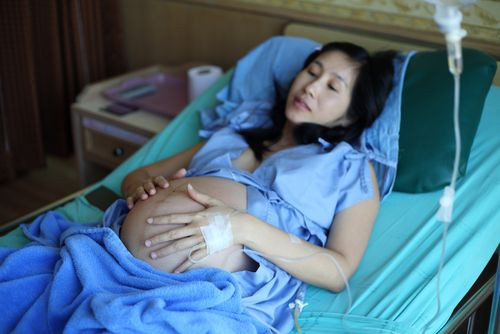Risk Of Postpartum Depression Decreases Among Women Who Receive Epidural During Childbirth

Pain and depression are well-acquainted friends. Yet few researchers studying postpartum depression have chosen to investigate how the pain experienced by a woman during childbirth influences the possibility of her experiencing depression. A Chinese study exploring this possible connection found those women who received an epidural during labor showed a decreased risk of postpartum depression as compared to women who did not receive an epidural. Controling pain during childbirth as well as during the post-delivery period may reduce the risk of postpartum depression, suggests Dr. Katherine Wisner, a perinatal psychiatrist at Northwestern Medicine, in an editorial accompanying the study.
What Causes Postpartum Depression?
New episodes of depression occur in nearly 15 percent of women during the first three months following the birth of a child, while more than one in five women experience postpartum depression during the first year following birth. Both biological and psychosocial factors contribute to depressive postpartum episodes. Past studies have proven women with postpartum depression are extraordinarily sensitive to the massive and sudden withdrawal of sex steroids that occurs during birth. Research also suggests negative early life experiences, such as physical abuse, generally increases vulnerability to depression. Despite this knowledge, scientists remain uncertain as to the exact origins of postpartum depression — and which women are most likely to fall prey to this often debilitating condition.
For their study of postpartum depression, a team of Chinese researchers enlisted the help of 214 women who were preparing for a vaginal delivery. At their request, 107 of the women received an epidural, a type of regional anesthesia commonly used during childbirth. The remaining women chose to labor and give birth without anesthesia. Following delivery, the researchers assessed the mental status of all the women using the Edinburgh Postnatal Depression Scale at three days and then again at six weeks.
What did the researchers find? Among the women who received an epidural, just 14 percent experienced depression, while nearly 35 percent fell victim among those who did not receive an epidural. The researchers discovered, too, that the women who attended pre-birth classes and breast-fed after delivery showed a decreased risk of postpartum depression. Finally, they found the women scoring high on the Edinburgh Postnatal Depression Scale at three days postpartum showed an increased risk of depression in subsequent months.
“The initiation of the postbirth period with maximal comfort sets in motion adaptive maternal behaviors and a positive emotional milieu for new motherhood,” Wisner noted. Once made aware of this information, doctors might monitor women patients who did not receive optimal pain management during birth. Conversely, they might evaluate those women who experience postpartum depression for perinatal pain.
In their conclusion, the Chinese scientists say further study is needed to verify their results, yet other questions remain. For instance, advocates of natural childbirth often promote other forms of pain management, such as meditation and breathing techniques, to take the place of anesthesia. Do alternative methods of pain management during childbirth reduce the risk of postpartum depression similar to the use of epidurals? Without a doubt, a study of natural childbirth and its relation to postpartum depression would interest many women.
Source: Ding T, Wang DX, Qu Y, Chen Q, Zhu SN. Epidural Labor Analgesia Is Associated with a Decreased Risk of Postpartum Depression: A Prospective Cohort Study. Anesthesia & Analgesia. 2014.
Published by Medicaldaily.com



























